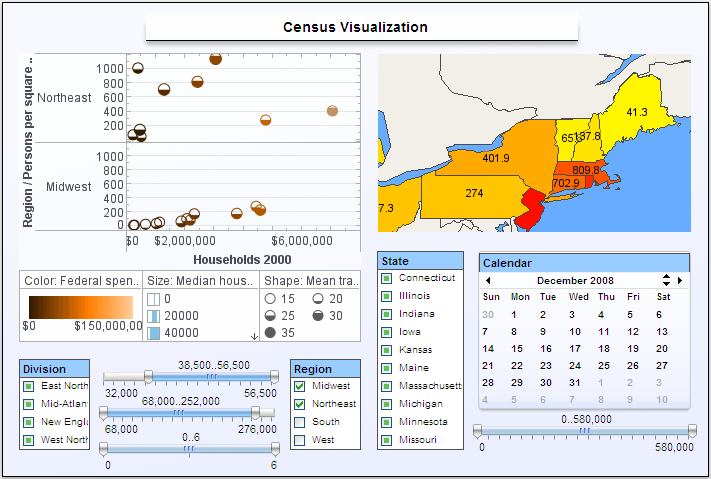Making Information the Most Valuable Commodity
This is the continuation of the transcript of a Webinar hosted by InetSoft on the topic of "Applying Business Intelligence to Manufacturing" The speaker is Mark Flaherty, CMO at InetSoft.
Next slide please. So, is there a path forward? Is there a way to move forward? We’ve been doing a lot of interviews and talking to folks right now about what is the way to go forward, and I think it’s an interesting thing when you start talking to people and you listen to what they are saying, you take a look at the trends.
Next slide, please. There is some thinking out that at this point the most valuable commodity and manufacturing is not energy. It’s not the goods. It’s the information that you use, that information about customers, about your products, about what customers are actually looking at. How do you build an entire solution for them? Information is the most valuable commodity. Information about your supply chain, your processes, everything is valuable.
The issue that you see with this right now, a lot of times is that, that information is not treated in any way, shape or form as if it is the most valuable commodity. A lot of data in a lot of firms is still scattered in lots and lots of places. It resides in a variety of different databases. It’s not uncommon to see even a small or midsized company with 20, 30, 40 different databases or more.
 |
View a 2-minute demonstration of InetSoft's easy, agile, and robust BI software. |
Outside an Established ERP System
You see a lot of data that is sitting in spreadsheets, especially for firms or plants that are using improvement methodology where they are going outside an established enterprise resource planning system. You actually see a lot of company’s data that still resides in hard copies, pieces of paper. Even when it is digitally located in databases, the issue is it’s not in a centralized database. It’s in spreadsheets. It’s in product drawings. It’s sitting on in some computers somewhere, somebody’s laptop, and that’s a problem.
Next slide please. If nobody can find the data, then you’re missing a lot of opportunities. One of the things that we’ve seen is that a number of manufacturers are starting to look at how do we analyze that data? A lot of them right now, frankly, are engaging IT companies, but also there are accounting companies, management consulting companies. They take a look at business intelligence and take a look at if we can find the data, if we could pull it together, how could we use that more intelligently?
Next slide please. And the reason they are doing this is because there is an increasing understanding. Information is the most valuable commodity that you have right now. If you don’t have that information, if you have misplaced it, it doesn’t just mean, well, you’ve also misplaced your profits, and there are a number of examples for that. You know, for example, we take a look at financials, you’ve got data uploads that are in different formats from different departments. What happens then is that your accounting procedures for even something is simple as an end of the month close or reports on profitability, by product line, or by unit, or by facility, those slow down to a crawl.
You take a look at salespeople where you’ve got sales leads coming in. One of the things we see over and over in manufacturing firms is that even as they get better at automating processes within the production plan, when you take a look at corresponding production processes, if you could call them that in their sales and marketing departments, is that leads generate, leads come in, they don’t go anywhere. They get stuck. An urgent inbound contact comes in with information from the people who want to be contacted now, but next week, the week after, they are responded to. Or sometimes they aren’t talked to for months even if the data is coming in digitally.
 |
View live interactive examples in InetSoft's dashboard and visualization gallery. |
Logistics Business Intelligence
When you look at logistics, it is absolutely critical right now. There is an expectation that has been built in consumers’ minds in particular and business customers as well that they are going to be able to track a shipment in real time and know where it is. Well, if they don’t know where it is they start to worry. They start to get anxious.
The other issue is you start seeing that with expanded global trade, knowing where something is in the world is very critical for profitability. You’ve got to get it through customs etcetera, and you’re also seeing that things with the supply chain management. You know, if a forecast for a specific manufacturing facility isn’t shared with the suppliers of that facility, those suppliers may not ramp up their production in time which can lead to part shortages, can lead to missed or incorrect deliveries and frankly can shut down an entire line and can shut down a product line.
Next slide please. So, we see right now how information is a valuable commodity, and there is lots of information just sitting in manufacturing companies. There is too much of it, in fact because there is not enough intelligence, and I don’t mean, obviously the IQs of the people running these firms. What I mean is not enough usable information presented in a way that people can use.
 |
Read how InetSoft was rated #3 for implementation in G2 Crowd's user survey-based index. |
| Previous: Getting Answers With Good Business Intelligence Tools |


